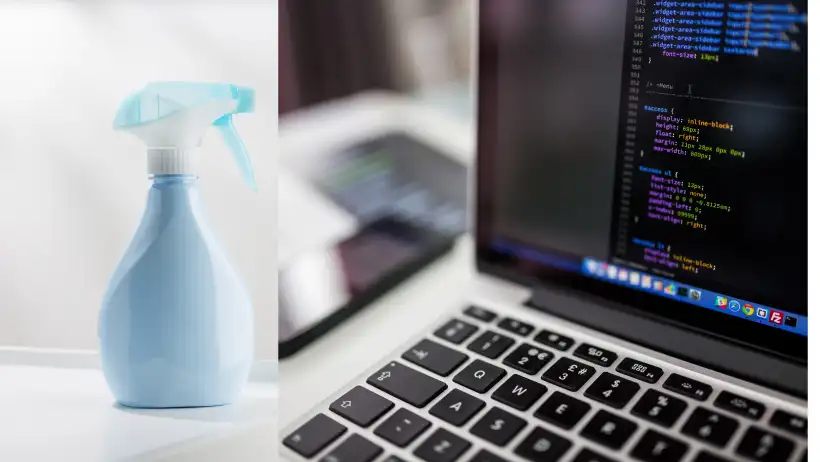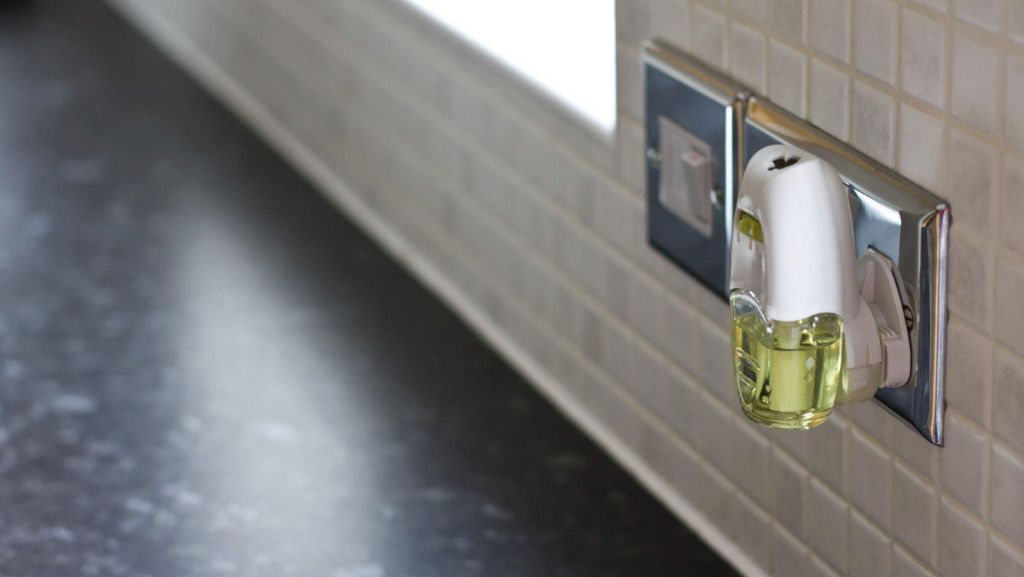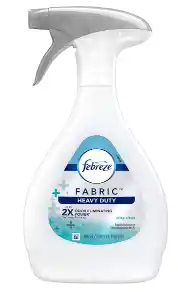Is it Safe to Use Air Freshener Around Computers? (+10 Alternatives)

Walking into a room and being greeted by a pleasant aroma can instantly lift your mood. But if you use air fresheners around your computer, is it actually safe?
This is an important question for any computer owner looking to make their workspace smell fresh.
Unfortunately, not all air fresheners are created equal when it comes to using them safely around sensitive electronics like computers. Certain chemical-based sprays and plugins may negatively impact your machine.
In this blog, we’ll explore the potential risks of popular air fresheners and provide tips for safer options that won’t damage your computer.
You’ll learn how to balance keeping the air fresh with protecting your expensive equipment.
Let’s dive in and settle the debate around whether enjoying a scented workspace poses a risk to your PC.
Harmful Effects of Chemical Air Fresheners on Computers
Chemical air fresheners, such as aerosol sprays, have become a popular way to combat unpleasant smells in our homes and workspaces. However, caution is advised due to the detrimental effects of volatile organic compounds (VOCs) emitted by these fresheners on our beloved machines.
VOCs Released by Air Fresheners
One of the primary concerns with chemical air fresheners, such as aerosols and spray, is their release of VOCs. These compounds easily evaporate into the air at room temperature, filling our surroundings with pleasant smells.
However, when these VOCs come into contact with computer components, trouble can arise.
Corrosion and Damage to Sensitive Electronic Parts
The VOCs emitted by chemical air fresheners, including aerosols, can lead to corrosion and damage sensitive electronic parts within a computer system. Over time, exposure to these compounds, especially from smoking, can corrode metal contacts, degrade circuit boards, and compromise the overall functionality of the machine.
This corrosion can disrupt electrical connections and hinder the smooth operation of various computer components. It is important to be mindful of the potential harm that these fresheners can cause to computer systems.
Performance Issues and Reduced Lifespan
Continued exposure to chemical air fresheners, particularly aerosols, near computers can result in performance issues and reduce their lifespan.
As VOCs accumulate inside a computer case, they may settle on critical hardware elements such as processors, memory modules, or graphics cards.
This accumulation can impede heat dissipation mechanisms and cause overheating problems that impact performance or even lead to irreversible damage.
It is important to be mindful of the potential negative effects of smoking near computers, especially in enclosed spaces, as this can exacerbate the issue. Therefore, it is advisable to avoid using air fresheners and smoking near computers to ensure their optimal functioning.
Moreover, prolonged exposure to VOCs from aerosols like spray air fresheners might cause gradual deterioration of internal components over time.
This degradation could manifest as random crashes, freezes, or other unexpected issues that hamper productivity and frustrate users concerned about air quality.
Awareness is Key
It is crucial for computer users to be aware of the potential harmful effects associated with using aerosols or chemical air fresheners near their systems. By understanding these risks upfront, individuals can take proactive measures in Nov to protect their computers and ensure longevity.
Instead of relying on chemical aerosols or nov air fresheners, consider alternative methods for maintaining a pleasant environment around your computer. Here are some options.
- Opt for natural air fresheners such as essential oil diffusers or homemade potpourri to keep your home smelling fresh and clean. Using these nov options can help eliminate unpleasant odors without the use of harsh chemicals.
- Keep the workspace well-ventilated in Nov by opening windows or using fans to circulate fresh air.
- Regularly clean your computer case and peripherals to remove dust and improve air quality. Use a spray air freshener to prevent the buildup of harmful particles and keep the air freshner.
Potential Fire Hazard of Plugin Air Fresheners Near Computers
It is essential to be aware of the potential risks associated with using these devices near computers. While they may seem harmless, plugin air fresheners can pose a serious fire hazard when used in close proximity to electronic equipment.
One of the primary concerns is the heat generated by these devices.
Plugin air fresheners often contain heating elements that warm up scented oils or release fragrance from solid wax. This heat can increase the risk of overheating in computer systems, especially if they are already running at high temperatures due to heavy usage or inadequate cooling.
Combining plugin air fresheners with dust accumulation near computers further escalates the fire hazards.
Dust tends to accumulate on computer components over time, and if it comes into contact with a heated plugin air freshener, it can ignite and potentially cause a fire. It’s important to note that even a small amount of dust combined with the heat from these devices can lead to disastrous consequences.

To prevent fire accidents, it is crucial to consider the potential risks associated with using plugin air fresheners near computers. Here are some steps you can take:
- Keep a safe distance: Ensure there is sufficient space between your computer and any plugin air freshener device. A distance of at least one meter (three feet) should be maintained to minimize the risk of heat transfer.
- Opt for alternatives: Instead of using plugin air fresheners, consider other options such as scented candles or room sprays that do not emit continuous heat. These alternatives pose fewer fire hazards when used responsibly.
- Regularly clean your computer components using appropriate cleaning tools and techniques recommended by manufacturers to ensure optimal air care and safety. Keeping your computer free from dust and debris is essential for its overall performance and to maintain a fresh air environment.
- Be cautious with placement: Avoid placing plugin air fresheners directly on or near your computer, especially in areas where dust tends to accumulate, such as under desks or near vents. Opt for locations that are away from electronic devices and potential fire hazards.
- Educate yourself about fire safety and air care: Understanding the basics of fire safety, including the use of air fresheners, can go a long way in preventing accidents. Familiarize yourself with fire extinguisher locations, evacuation routes, and general safety protocols in case of emergencies.
Choosing the Safest Air Freshener for Computer Environments
Ensuring that the air around your devices is clean and safe is crucial. One common concern many people have is whether it’s safe to use air fresheners near computers. The good news is that there are steps you can take to choose the safest options and keep your computer running smoothly.
Opt for natural and organic air fresheners
One of the best ways to ensure safety when using air fresheners around computers is by opting for natural and organic products. These types of air fresheners are typically free from harmful chemicals or volatile organic compounds (VOCs) that could potentially damage your computer. Look for products made with ingredients like essential oils, plant extracts, or natural fragrances.
Look for “computer-safe” labels or specialized designs
To further minimize any potential risks, consider choosing air fresheners specifically labeled as “computer-safe” or those designed for use around electronic devices. These products are formulated with computer-friendly ingredients that won’t harm sensitive electronic components. They often undergo rigorous testing to ensure their compatibility with technology.
Consider fragrance-free alternatives
If you’re concerned about the impact of scented air fresheners on your computer, there are fragrance-free alternatives available that can effectively eliminate odors without risking any damage. Activated charcoal and baking soda are two excellent options in this regard:
- Activated charcoal: This porous substance has exceptional odor-absorbing properties and can help purify the air without emitting any fragrance.
- Baking soda: Known for its ability to neutralize odors, baking soda can be placed in open containers near your computer to absorb unwanted smells.
By considering these fragrance-free alternatives, you can maintain a pleasant working environment without worrying about potential harm to your computer.
Research and select the safest options
Choosing the right air freshener option requires some research on your part. Take the time to read product labels, check for customer reviews, and consider any specific recommendations from computer experts. By doing so, you can make an informed decision and select an air freshener that meets your needs while keeping your computer safe.
Safety of Electronic Air Fresheners Around Computers
Electronic air fresheners are a safer choice around computers than chemical-based products. Traditional air fresheners emit volatile organic compounds (VOCs) that can damage sensitive computer components through chemical reactions.
Electronic air fresheners avoid this by dispersing scents without VOCs. Models designed specifically for use near electronics incorporate shielding and circuitry to minimize electromagnetic emissions that could disrupt computers.
Choosing electronic air fresheners labeled as safe for electronics lets you enjoy pleasant scents without worrying about hardware damage. Beyond being computer-safe, electronic air fresheners often feature sleek, modern designs and adjustable fragrance settings.
However, exercise caution if young children are present who may tamper with the device near equipment. While electronic air fresheners are generally safe for computers when used appropriately, traditional chemical-based fresheners carry risks.
Making the switch to electronic models lets you keep the air fresh without compromising your computer systems.
10 Alternatives to Chemical Air Fresheners for a Computer-Friendly Environment
Looking for ways to freshen up your workspace without risking harm to your computer? Look no further! Here are ten natural alternatives that will leave your surroundings smelling delightful while keeping your computer safe.
Essential Oil Diffusers: Aromatic Bliss Without the Risk

One of the safest and most popular alternatives to chemical air fresheners is an essential oil diffuser. These devices disperse natural scents into the air, creating a pleasant environment without emitting harmful chemicals. Simply add a few drops of your favorite essential oil, such as lavender or lemon, and let the diffuser work its magic.
Vinegar and Coffee Grounds: Odor Absorption Powerhouses

If you’re dealing with unwanted odors near your computer, try placing bowls of vinegar or coffee grounds in the vicinity. Both vinegar and coffee have strong odor-absorbing properties that can help neutralize unpleasant smells. The acidity of vinegar helps eliminate odors, while coffee grounds act as natural deodorizers.
Air-Purifying Plants: Nature’s Freshness Boosters
Indoor plants not only add a touch of greenery but also improve air quality by absorbing toxins and releasing oxygen.
Opt for plants known for their air-purifying properties, such as snake plants, peace lilies, or spider plants. These green companions will help create a healthier and fresher environment around your computer.
Ventilation: Let Fresh Air In
Regularly ventilating your workspace is crucial for maintaining a clean and fresh-smelling environment. Open windows whenever possible to allow fresh air circulation. If opening windows isn’t an option, consider using fans to keep the air moving. By promoting airflow, you reduce the need for artificial fragrances while ensuring a constant supply of clean air.
Beeswax Candles: Natural Fragrance Delight
Beeswax candles are a wonderful alternative to chemical air fresheners.
Not only do they emit a warm and soothing glow, but they also release a subtle natural fragrance when burned. Beeswax candles are free from harmful toxins and can create a cozy atmosphere without posing any risk to your computer.
Citrus Peels: Zesty Freshness
Don’t throw away those citrus peels just yet! Instead of reaching for an air freshener, place orange, lemon, or grapefruit peels near your computer. The natural oils in the peels will release a refreshing citrus scent that can help mask unwanted odors.
Potpourri: Dried Flowers for Fragrant Charm

Create your own potpourri using dried flowers and herbs. This delightful mixture not only adds visual appeal but also releases gentle scents into the air. Combine lavender buds, rose petals, and dried herbs like thyme or mint for a personalized blend that suits your taste.
Fabric Sprays: Instant Freshness Boost
If you’re looking for a quick way to freshen up your workspace, fabric sprays are an excellent option.

Choose organic compounds like essential oil-based sprays or those made with natural ingredients. A light spritz on curtains or upholstery can instantly transform the ambiance while leaving behind a pleasant scent.
Odor-Neutralizing Gels: Long-Lasting Freshness
Odor-neutralizing gels are another effective alternative to chemical air fresheners.
Conclusion
Traditional air fresheners can damage computers and irritate health. Chemicals released by plugins and sprays pose fire and respiratory risks. For computer safety, choose electronic air fresheners that diffuse oils or natural fragrances without chemicals.
Non-electronic alternatives like baking soda or vinegar also avoid harm. Ultimately, prioritizing safety protects your computer’s longevity and contributes to a healthier workspace.
Make informed choices and opt for safer air freshener alternatives to eliminate risks from chemicals and plugins around sensitive computer components.
Careful product selection creates an optimal environment for both you and your computer.
FAQs
Q: Can using an air freshener damage my computer?
Using certain types of air fresheners, particularly those containing chemicals or plugins near your computer, can potentially damage its components over time.
Q: Are there any fire hazards associated with using air fresheners around computers?
Yes, plugin air fresheners near computers pose a fire hazard due to their electrical nature. It is advisable to avoid using such devices in close proximity to your computer.
Q: Do chemical air fresheners have harmful effects on humans as well?
Yes, the chemicals released by chemical air fresheners can irritate the respiratory system and trigger allergies or asthma in individuals.
Q: What are some safer alternatives to chemical air fresheners for a computer environment?
Some safer alternatives include electronic air fresheners that use essential oils or natural fragrances, as well as non-electronic options like baking soda, vinegar bowls, or natural room sprays made from essential oils.
Q: How can I create a computer-friendly environment with regards to air freshener use?
To create a computer-friendly environment, prioritize safety by choosing safe air freshener options and considering alternative methods that do not pose risks to your computer’s components or your health.



